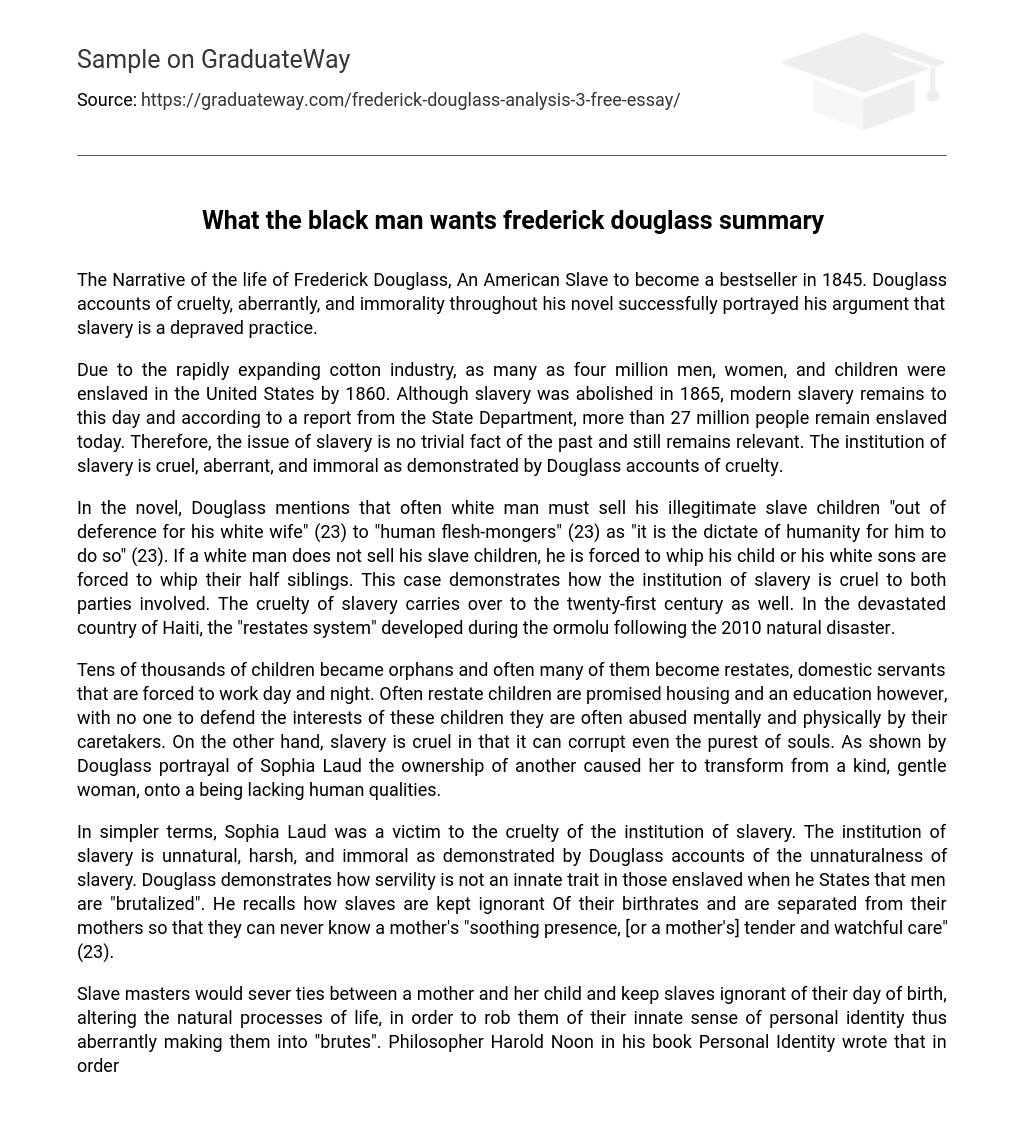The Narrative of the life of Frederick Douglass, An American Slave to become a bestseller in 1845. Douglass accounts of cruelty, aberrantly, and immorality throughout his novel successfully portrayed his argument that slavery is a depraved practice.
Due to the rapidly expanding cotton industry, as many as four million men, women, and children were enslaved in the United States by 1860. Although slavery was abolished in 1865, modern slavery remains to this day and according to a report from the State Department, more than 27 million people remain enslaved today. Therefore, the issue of slavery is no trivial fact of the past and still remains relevant. The institution of slavery is cruel, aberrant, and immoral as demonstrated by Douglass accounts of cruelty.
In the novel, Douglass mentions that often white man must sell his illegitimate slave children “out of deference for his white wife” (23) to “human flesh-mongers” (23) as “it is the dictate of humanity for him to do so” (23). If a white man does not sell his slave children, he is forced to whip his child or his white sons are forced to whip their half siblings. This case demonstrates how the institution of slavery is cruel to both parties involved. The cruelty of slavery carries over to the twenty-first century as well. In the devastated country of Haiti, the “restates system” developed during the ormolu following the 2010 natural disaster.
Tens of thousands of children became orphans and often many of them become restates, domestic servants that are forced to work day and night. Often restate children are promised housing and an education however, with no one to defend the interests of these children they are often abused mentally and physically by their caretakers. On the other hand, slavery is cruel in that it can corrupt even the purest of souls. As shown by Douglass portrayal of Sophia Laud the ownership of another caused her to transform from a kind, gentle woman, onto a being lacking human qualities.
In simpler terms, Sophia Laud was a victim to the cruelty of the institution of slavery. The institution of slavery is unnatural, harsh, and immoral as demonstrated by Douglass accounts of the unnaturalness of slavery. Douglass demonstrates how servility is not an innate trait in those enslaved when he States that men are “brutalized”. He recalls how slaves are kept ignorant Of their birthrates and are separated from their mothers so that they can never know a mother’s “soothing presence, [or a mother’s] tender and watchful care” (23).
Slave masters would sever ties between a mother and her child and keep slaves ignorant of their day of birth, altering the natural processes of life, in order to rob them of their innate sense of personal identity thus aberrantly making them into “brutes”. Philosopher Harold Noon in his book Personal Identity wrote that in order to “survive” and be “identifiTABLE” one must have personal identity. Without a personal identity one, the slaves in this case, cannot define what unethical treatment is. Douglass accounts of immorality, aberrantly, and cruelty demonstrate how the institution of slavery is corruptive.
Douglass states that despite how piteous Edward Covey portrayed himself to be, he would willing support adultery by forcing a slave woman Caroline to be bedded every night by a married slave. Douglass also conveys that absolute power tempts slave owners to rape and become morally corrupt. Often perpetrators of these immoral acts were “devout Christians” which Douglass alludes to be “false Christianity”, a force that would soothe the moral consciences of immoral slave owners. As stated by Lord Acton, a historian and moralist, “Power corrupts, absolute power Corrupts absolutely”.
Absolute authority, as shown by the roman emperors, led to the belief that the emperors were gods among men which corrupted the order of the government. While it is true that, according to William John Grandson’s The Hireling and the Slave, the institution of slavery provides home, food, clothing, and work for slaves, it does not necessarily follow that enslavement is the best route of employment for Africans and African Americans. According to Douglass, his master would only provide the minimum of food and clothing and a child was only provided two coarse shirts a year.
Despite William Grandson’s assertion, in reality many slaves lived comparTABLE to livestock and were not provided security of a livelihood by their masters. Frederick Douglass eloquent autobiography was paramount to the abolitionist movement because it adequately depicted the cruel, damaging effects of slavery. Furthermore, his effective arguments would eventually generate a new genre of literature and become the basis for many civil rights movements throughout h story. Corrupts, absolute power corrupts absolutely’. Absolute authority, as shown movements throughout history.





